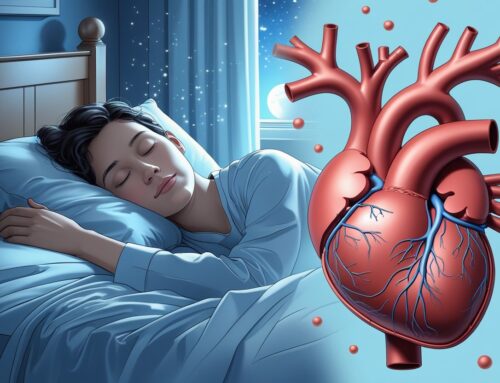Sleep is important in maintaining mental health. Quality sleep significantly impacts emotional well-being, reducing anxiety and depression. Many studies confirm that poor sleep increases emotional distress and the risk of mental health disorders.
Understanding the various phases of sleep helps explain how each stage supports cognitive functions and emotional stability. The effects of sleep deprivation are particularly concerning, as they can exacerbate existing mental health issues and create new challenges. As sleep quality improves, individuals often experience better mood regulation and overall mental clarity.
Prioritizing sleep hygiene and addressing sleep disorders is essential for better mental health. The right strategies and preventive measures can enhance sleep and, in turn, strengthen mental well-being.
Key Takeaways
- Quality sleep is essential for emotional well-being.
- Sleep deprivation worsens mental health conditions.
- Good sleep habits improve mental clarity and mood.
- Quality sleep strengthens mental health because it helps balance emotions, sharpen focus, and ease anxiety. The right mattress supports deeper rest, which boosts overall mental well-being.

Understanding Sleep and Its Phases

Sleep is essential for maintaining both physical and mental health. It consists of various stages, each playing an important role in how the body and brain function. This section covers the different stages of sleep and explains the sleep cycle that influences mental well-being.
Stages of Sleep
Sleep is divided into two main types: Non-Rapid Eye Movement (NREM) and Rapid Eye Movement (REM). Each of these types contains several stages that are vital for recovery and brain health.
NREM Sleep consists of three stages:
- Stage 1 (N1): A light sleep that serves as the transition from wakefulness.
- Stage 2 (N2): A deeper sleep where the heart rate slows and body temperature drops.
- Stage 3 (N3): Also known as deep sleep, this stage is critical for physical recovery and growth.
REM Sleep occurs about 90 minutes after falling asleep. This stage is when dreaming takes place, and it plays an important role in emotional regulation and memory consolidation.
Spending enough time in these stages helps prevent mood disorders and supports overall mental health.
The Sleep Cycle
The sleep cycle consists of multiple repetitions of NREM and REM stages throughout the night. Each complete cycle lasts about 90 to 120 minutes, and most people go through four to six cycles per night.
As the night progresses, REM sleep periods become longer, while deep NREM sleep decreases. This balance helps the brain manage emotional stress for the following day.
A lack of quality sleep can contribute to anxiety and depression. Because sleep restores cognitive function and improves mood, it is essential for maintaining mental health.
The Link Between Sleep and Mental Health
Sleep plays a crucial role in mental health, and poor sleep can lead to various psychological issues. It affects emotional well-being and often worsens existing mental health conditions. Understanding this connection is essential for maintaining balance in life.
Psychological Impact of Sleep Deprivation
Sleep deprivation can have severe psychological effects. Insufficient sleep increases negative emotional responses. Individuals may feel more anxious or irritable after a night of poor sleep. This can lead to a cycle where anxiety disrupts sleep, creating further issues. Lack of sleep is also linked to more severe mental health conditions, including depression. Studies show that those who struggle with sleep face a higher risk of experiencing suicidal thoughts.
Recognizing this connection allows individuals to take proactive steps. Prioritizing sleep improves emotional health and reduces overall mental distress.
Sleep Disorders and Mental Health Conditions
Sleep disorders, such as insomnia, have a strong link to mental health. Insomnia is often considered both a symptom and a contributor to anxiety and depression. Research indicates that individuals with insomnia frequently struggle with mood regulation. They are more likely to experience hopelessness and anxiety, creating a vicious cycle where mental health problems worsen insomnia, making recovery even harder.
Treating sleep disorders can significantly improve mental health. Strategies like cognitive behavioral therapy for insomnia (CBT-I) address both issues at once. Better sleep restores energy and enhances emotional stability and resilience.

Effects of Sleep Deprivation
Sleep deprivation significantly affects various aspects of mental health. It alters cognitive functions, emotional well-being, and physical health. Recognizing these effects is essential for understanding the importance of quality sleep in daily life.
Cognitive Functions
Lack of sleep disrupts cognitive functions such as attention, memory, and decision-making. Without enough rest, the brain processes information more slowly. This can lead to difficulties in concentrating and remembering details.
Furthermore, sleep deprivation often leads to “fuzzy thinking,” making it difficult to articulate thoughts clearly. Studies show that chronic sleep loss weakens problem-solving skills and critical thinking, which can hinder performance at work or school and increase the likelihood of errors and accidents.
Emotional Well-Being
Emotional health is closely linked to sleep quality. Insufficient rest often results in heightened anxiety and irritability. Sleep-deprived individuals are more prone to negative emotional reactions.
Additionally, a lack of sleep reduces positive moods. Research indicates that sleep loss raises the risk of depression and anxiety symptoms. This emotional distress can create a cycle in which poor mental health further disrupts sleep, worsening the overall situation.
Physical Health Consequences
Sleep deprivation also affects physical health. Chronic lack of sleep elevates stress hormones, increasing the risk of obesity, diabetes, and cardiovascular issues. Moreover, it weakens the immune system, making individuals more susceptible to illnesses. This is especially concerning in the context of mental health since poor physical well-being can contribute to emotional instability and cognitive decline.
Understanding these connections underscores the importance of prioritizing sleep to maintain both mental and physical well-being.

Importance of Quality Sleep for Mental Health
Quality sleep affects mental health. It influences mood, emotional stability, and cognitive function. Proper sleep enables individuals to better handle stress and enhances overall wellbeing.
Sleep Hygiene and Practices
Sleep hygiene refers to habits that promote good sleep quality. Maintaining a regular sleep schedule, such as going to bed and waking up at the same time each day helps regulate the body’s internal clock. Creating a relaxing bedtime routine can also improve sleep quality. Activities like reading or taking a warm bath can signal the body that it is time to wind down.
The sleep environment matters too. A dark, cool, and quiet room supports better sleep. Limiting screen time before bed helps reduce exposure to blue light, which can interfere with falling asleep. Lastly, managing stress through techniques like meditation or deep breathing can enhance sleep quality. All these practices contribute to better mental health and emotional well-being.

Managing Sleep Disorders to Improve Mental Health
Addressing sleep disorders is essential for enhancing mental health. Effective management can significantly reduce symptoms of insomnia and improve overall well-being. Understanding the specific treatments for insomnia and sleep apnea can lead to better sleep quality and mental health outcomes.
Treatment and Management of Insomnia
Insomnia directly affects mental health by increasing risks for anxiety and depression. A combination of therapies is often most effective.
- Cognitive Behavioral Therapy (CBT): This therapy helps patients recognize and change thoughts and behaviors that cause insomnia. It has proven highly effective for chronic insomnia.
- Sleep Hygiene: Practicing good sleep habits improves sleep quality. Maintaining a consistent sleep schedule, creating a comfortable environment, and limiting screen time before bed all contribute to better rest.
- Medications: In some cases, doctors prescribe sleep aids, though this should be a short-term solution to avoid dependency.
A comprehensive plan combining these methods can significantly improve sleep and, in turn, mental health.
Addressing Sleep Apnea
Sleep apnea is a serious condition that affects mental health when left untreated. Repeated breathing interruptions during sleep lead to poor rest and increased health risks.
- Continuous Positive Airway Pressure (CPAP): This is a common treatment for obstructive sleep apnea. CPAP machines keep airways open, allowing for uninterrupted sleep.
- Lifestyle Changes: Weight loss and avoiding alcohol can reduce the severity of sleep apnea. Maintaining a healthy lifestyle also supports better mental health.
- Surgery: In some cases, surgery might be necessary to correct physical obstructions in the airway.
By effectively addressing sleep apnea, individuals can experience improved sleep quality and a decrease in related mental health issues.

Preventive Measures and Tips for Healthy Sleep
Maintaining good sleep habits is essential for mental health. Certain lifestyle adjustments, relaxation techniques, and optimizing the sleep environment can significantly improve sleep quality and, in turn, mental well-being.
Lifestyle Adjustments
A consistent sleep schedule helps regulate the body’s internal clock. Going to bed and waking up at the same time each day can reduce feelings of anxiety and improve mood. Limiting screen time before bed is also crucial, as blue light disrupts sleep. Cutting back on caffeine and alcohol in the evening further supports restful sleep. Instead, focus on foods that promote relaxation, such as complex carbohydrates and lean proteins.
Physical activity plays an important role as well. Exercise relieves anxiety and supports a healthy sleep pattern. Even a 30-minute walk each day can make a noticeable difference.
Relaxation Techniques
Incorporating relaxation techniques before bed can calm the mind and prepare the body for sleep. Practices like deep breathing or progressive muscle relaxation are effective methods to reduce anxiety, often caused by sleep deprivation. Meditation and mindfulness exercises also help by improving both sleep and overall mental health. Listening to calm music or nature sounds before bed creates a peaceful transition to sleep.
Establishing a bedtime routine with these techniques signals the body that it is time to unwind.
Sleep Environment Optimization
Optimizing the sleep environment promotes restful sleep. A dark, cool room can significantly enhance sleep quality. Using blackout curtains can keep out unwanted light, while a comfortable mattress and bedding can support better rest. Minimizing noise is equally important. Earplugs or a white noise machine can help drown out disturbances. Maintaining a room temperature around 65°F improves both sleep duration and quality.
A clean and organized space can positively affect mental health. Clutter can contribute to feelings of stress and anxiety. Taking time to maintain a tidy bedroom can promote a calm atmosphere, conducive to sleep.

Future Research Directions
Future studies should examine the importance of sleep in mental health by exploring various interventions. Researchers could investigate ways to integrate sleep improvements into existing mental health services.
Understanding the connection between sleep disruption and mental health symptoms is essential. Studies indicate that poor sleep quality early on can lead to future mental health issues, highlighting the need for research into preventive measures.
Examining specific populations would also be valuable. Individuals with psychiatric disorders frequently experience sleep disturbances, so targeted research could help identify effective treatments tailored to their needs. In addition, exploring new technologies that monitor sleep could offer insights into sleep patterns, allowing for real-time adjustments to improve sleep quality.
Researchers should also consider lifestyle factors such as diet, exercise, and stress management, which influence both sleep and mental health. A deeper understanding of these relationships could lead to more comprehensive care strategies.
Collaboration between sleep specialists and mental health professionals will be crucial. By working together, they can develop more effective interventions. Future research in these areas will significantly improve outcomes for individuals with mental health disorders. Sleep clearly plays a vital role in overall well-being.
How the Right Mattress Supports Sleep and Mental Health
Mattress affects quality sleep. Good sleep is closely linked to mental health. A proper mattress can help reduce stress and anxiety. A mattress should provide the right balance of comfort and support. When it keeps the spine properly aligned, it prevents aches and enhances overall sleep comfort.
A quality mattress also helps regulate body temperature. This is important because a comfortable sleep environment leads to deeper and more restful sleep. Disturbances during the night can affect mood and mental clarity.
Here are some key points on how a mattress impacts sleep and mental health:
- Spinal Alignment: Proper support maintains the spine’s natural curve.
- Pressure Relief: A good mattress minimizes pressure points that cause discomfort.
- Temperature Control: Breathable materials help regulate body heat for better comfort.
Individuals who sleep well are more likely to feel energized and focused during the day. The right mattress can contribute significantly to better sleep quality, which in turn supports better mental health. Investing in a good mattress is a step towards improved well-being and mental clarity.
The Brooklyn Bedding Aurora Luxe Cooling is a great choice that enhances both sleep quality and mental health. A mattress that properly supports the spine helps prevent aches, and this hybrid design combines individually encased coils with high-density foam to keep the body aligned. Better support leads to deeper, more comfortable sleep, which can ease stress and promote mental clarity.
Since body temperature affects sleep quality, the Brooklyn Bedding Aurora Luxe Cooling’s advanced cooling technology prevents overheating and minimizes sleep disruptions. Consistently comfortable sleep improves mood and emotional resilience, both of which are essential for mental health.
Additionally, this mattress has exceptional pressure relief through its multiple foam layers, reducing pressure points that can cause tossing and turning. Deeper and uninterrupted sleep supports emotional balance and cognitive function, helping individuals feel more energized and focused throughout the day. By fostering better sleep, the Aurora Luxe contributes to reduced stress and anxiety, ultimately supporting overall mental well-being.

Frequently Asked Questions
Sleep affects mental health. The questions that follow address how sleep affects psychological well-being, the impacts of sleep deprivation, and the benefits of maintaining healthy sleep patterns.







